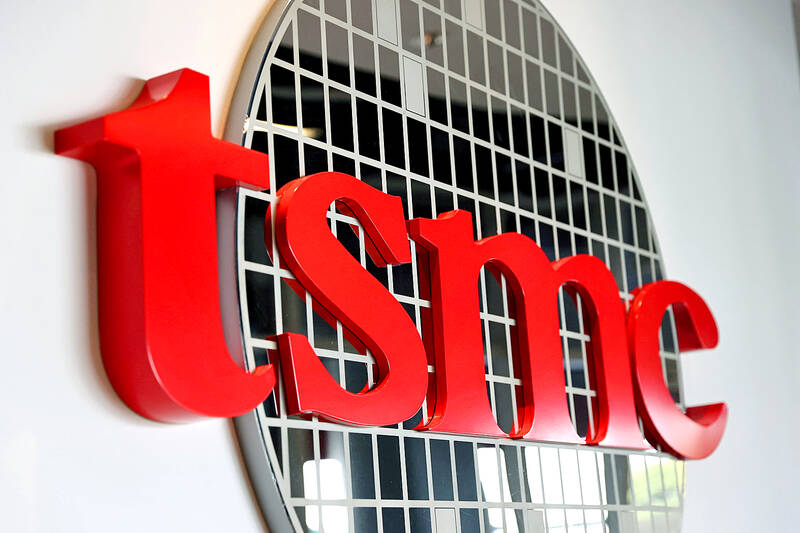Taiwan Semiconductor Manufacturing Co (TSMC, 台積電) accounted for 30 percent of the sales in the global IC industry last year, it said on Friday.
The figure excludes memory chips, the world’s largest contract chipmaker said in a report to shareholders ahead of its annual general meeting on June 6.
It was the first time that the company’s revenue made up 30 percent of the global total and represents a 4 percent annual increase, TSMC said.

Photo: Reuters
The company said it generated NT$2.26 trillion (US$73.76 billion) in consolidated sales last year, up 42.6 percent from a year earlier and the 13th consecutive annual increase.
“The year 2022 was a landmark year for TSMC,” the chipmaker said. “Supported by our strong technology leadership and differentiation, we delivered the 13th consecutive year of record revenue, with strong profitable growth.”
TSMC at the end of last year began the commercial production of chips made using its advanced 3-nanometer process. The company at the time said it expects the chips to contribute significantly to its revenue in the third quarter.
Advanced technologies, meaning 7 nanometers and below, made up 53 percent of TSMC’s total wafer revenue last year, up from 50 percent in 2021.
Net profit last year totaled NT$1.01 trillion, up 70.4 percent from a year earlier, on the back of robust global demand for emerging technologies, such as automotive electronics, 5G applications and high-performance computing devices, the company said.
Earnings per share nearly tripled over the past three years to reach NT$39.2 last year, TSMC said.
The company said it shipped about 15.30 million 12-inch equivalent wafers last year, up 1.1 million units from a year earlier.
The increase came after the company deployed 288 distinct process technologies and rolled out 12,698 products for 532 customers.
The chipmaker is developing the more sophisticated 2-nanometer process, which is expected to enter commercial production in 2025, with a trial run scheduled for next year.
TSMC said the process would be the most advanced semiconductor technology in the global IC industry in density and energy efficiency.
However, TSMC was not spared from ongoing inventory adjustments in the global semiconductor industry amid weakening demand from end users.
Last month, TSMC told investors that sales this year would fall 1 to 6 percent from last year in US dollar terms, a downgrade from its January estimate of a “slight increase.”
The chipmaker has kept its capital expenditure budget within a range of US$32 billion to US$36 billion for this year, even though sales in the first quarter fell 18.7 percent from the previous quarter to NT$508.63 billion, and net profit dropped 30 percent to NT$206.99 billion.

MORE VISITORS: The Tourism Administration said that it is seeing positive prospects in its efforts to expand the tourism market in North America and Europe Taiwan has been ranked as the cheapest place in the world to travel to this year, based on a list recommended by NerdWallet. The San Francisco-based personal finance company said that Taiwan topped the list of 16 nations it chose for budget travelers because US tourists do not need visas and travelers can easily have a good meal for less than US$10. A bus ride in Taipei costs just under US$0.50, while subway rides start at US$0.60, the firm said, adding that public transportation in Taiwan is easy to navigate. The firm also called Taiwan a “food lover’s paradise,” citing inexpensive breakfast stalls

TRADE: A mandatory declaration of origin for manufactured goods bound for the US is to take effect on May 7 to block China from exploiting Taiwan’s trade channels All products manufactured in Taiwan and exported to the US must include a signed declaration of origin starting on May 7, the Bureau of Foreign Trade announced yesterday. US President Donald Trump on April 2 imposed a 32 percent tariff on imports from Taiwan, but one week later announced a 90-day pause on its implementation. However, a universal 10 percent tariff was immediately applied to most imports from around the world. On April 12, the Trump administration further exempted computers, smartphones and semiconductors from the new tariffs. In response, President William Lai’s (賴清德) administration has introduced a series of countermeasures to support affected

CROSS-STRAIT: The vast majority of Taiwanese support maintaining the ‘status quo,’ while concern is rising about Beijing’s influence operations More than eight out of 10 Taiwanese reject Beijing’s “one country, two systems” framework for cross-strait relations, according to a survey released by the Mainland Affairs Council (MAC) on Thursday. The MAC’s latest quarterly survey found that 84.4 percent of respondents opposed Beijing’s “one country, two systems” formula for handling cross-strait relations — a figure consistent with past polling. Over the past three years, opposition to the framework has remained high, ranging from a low of 83.6 percent in April 2023 to a peak of 89.6 percent in April last year. In the most recent poll, 82.5 percent also rejected China’s

PLUGGING HOLES: The amendments would bring the legislation in line with systems found in other countries such as Japan and the US, Legislator Chen Kuan-ting said Democratic Progressive Party (DPP) Legislator Chen Kuan-ting (陳冠廷) has proposed amending national security legislation amid a spate of espionage cases. Potential gaps in security vetting procedures for personnel with access to sensitive information prompted him to propose the amendments, which would introduce changes to Article 14 of the Classified National Security Information Protection Act (國家機密保護法), Chen said yesterday. The proposal, which aims to enhance interagency vetting procedures and reduce the risk of classified information leaks, would establish a comprehensive security clearance system in Taiwan, he said. The amendment would require character and loyalty checks for civil servants and intelligence personnel prior to